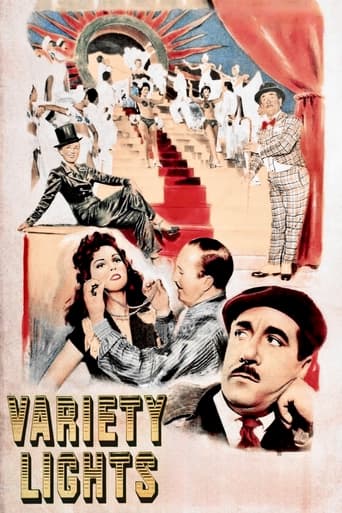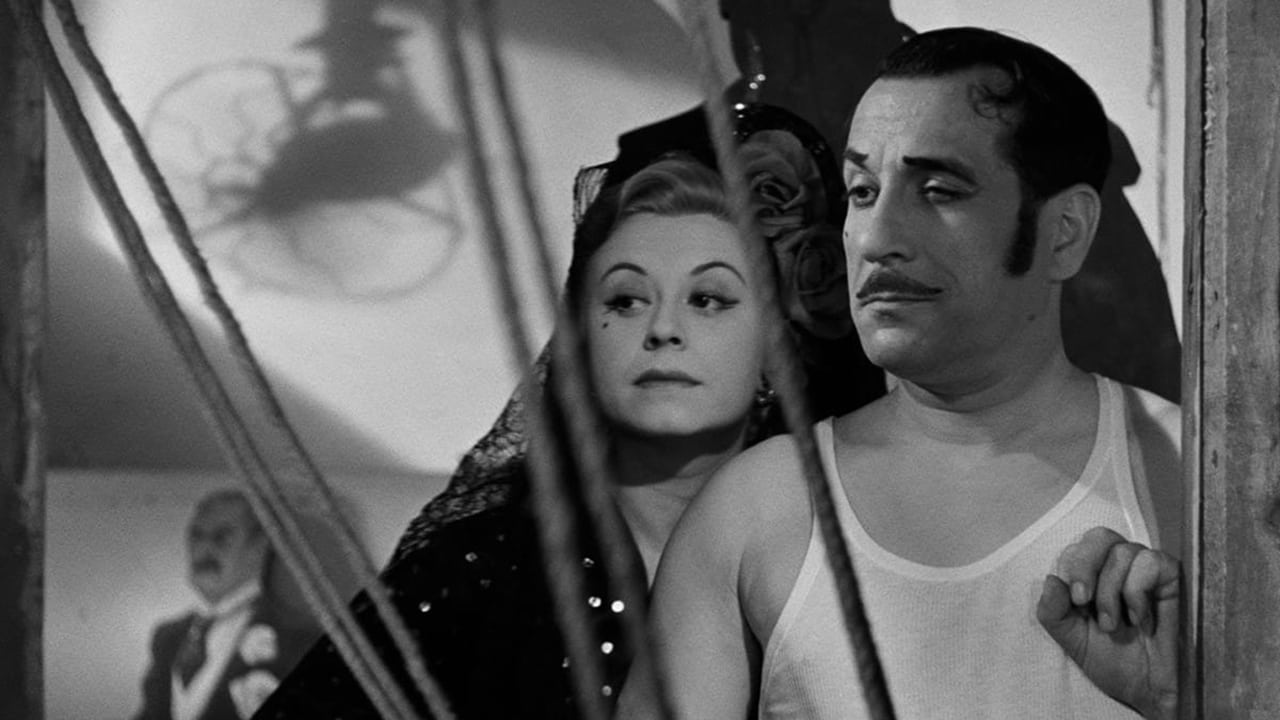felixoteiza
At the end of Intervista, Fellini mentions the complaints of one former producer because of the usual dark ending of his films and that he kept asking him for "a little ray of sunshine". Well if something can be said right off the bat of VL is that in its case that little sunshine wasn't necessary after all. If this movie was the work of a single director I wouldn't hesitate calling it mediocre but as its was a joint effort I have to conclude there were two conflicting, almost opposing, styles at work there, so the film works its way to its conclusion as a ship sailing with two skippers struggling for possession of the helm, each one prevailing at given a time and producing as the result a rather zigzagging course. Black humor flirts with drama and then with tragedy, but that's all.I haven't seen many Fellini works, but I have seen enough to deduce they are structured on 3 basic components, each one originating its next, something even more clear during his neo realist period. First, individual/collective drama--sometimes presented at as black comedy turning into drama--which occasionally ends up in tragedy, all that the product of fascism, war and the resulting social desegregation and dislocation. Second, as the fruit of it, a thoroughly troubled relationship between his own generation and authoritative figures in society: parents, teachers, priests; institutions in general--fart noises, raspberries, being a usual form of revolt. Third, the childhood traumas resulting from the other two--girl being burned alive in Julietta for ex.--that will manifest later in life as emotional/sexual stagnation. That's the blueprint for most Fellinis I've seen and because of that I conclude about VL is that this film is not a pure Fellini but a very diluted, hybrid, even adulterated one. He was certainly kept under tight control here.Fellini shot VL in the same period he made two other films similar in settings, characters: Il Bidone & I Vitelloni, All three show people who are leeches of others—relatives, society—who see them just as preys or at least as sources of income; the only difference being that he loves the characters in IV (I explain that in that review) while he is indifferent to those in IB and VL. That allows me to conclude that had he been left alone doing this one he would have delivered these people to their (probably sad) fate, as he did in IB, but that every time he was about to do so, the other skipper took the helm and moved the ship the other way. I don't agree wit the DVD text, about Fellini, Latuatta loving these characters. I think the first thing writers give characters they love is dignity and in the case of artists, that means talent, at least a bit of it, and what we see here is only a bunch of talentless drones. That's why I don't think Fellini loved them. He may have loved real life vaudeville artists but fiction characters are different. They are our own creation and it just may happen that we disliked them and that we show it by making them pathetic. We may pity them, but pity is not love.VL is about a troupe of vaudevillians living a day to day existence. We have there the usual characters, magician, clairvoyant, female dancers, etc. To the troupe arrives and sticks like glue, a young, attractive woman who wants to be dancer too. The troupe reject her because they would have to share an already poor pie with one more member, but also for jealousy. Something happens then that forces them to accept her and rapidly she becomes the main attraction. Now most in the troupe love her, specially its director, Checco, who was fond of her from the start anyway, to the great dismay of his girlfriend, Massina's Melina. But the new girl shows up to be just a manipulative leech, only interested in using Checco as a stepping stone. Using her influence on Checco she spends troupe money in hats and dresses so she can frequent ritzier places. In one of those places she finds her next Svengali and then she takes off with him. At the end we see her waving Checco goodbye while taking off to Milan. Later aboard the train where the troupe travels to some provincial town, Checco profits from the brief absence of his now wife Melina to work his charms on yet another young woman who just got into the train.The story is trivial and predictable; we know early on that only lame things will happen because Fellini's pathos is kept well under control. For. ex. when they are all invited by a duke to his estate. During he night he aristocrat tries to work his way into the starlet's bed but he's stopped by Checco, who suddenly appears keen in preserving decency. Later there's absolutely no tension between him and Svengali II when this last steals the girl from him. The only pathos we see in the whole film is when he goes back to Melina, asking her for money, because of the starlet and Melina cries, pitying herself. The rest is lame, predictable.In all, not interesting enough for regular viewers. Only for those interested in Fellini's work, to see the results of his genius being kept under tight rein. 6/10.
MartinHafer
This film was co-directed by Fellini and is one of his earliest works (his first directing, though he'd written some scripts for earlier films). Most of his films through the 1950s were very straight forward dramas and many of them were extremely touching and unforgettable. This movie fits in very nicely with these films such as THE WHITE SHEIK, I VITELLONI and LA STRADA. If you are looking for the symbolic Fellini like in 8 1/2 or the weird Fellini such as in SATYRICON or CASSANOVA, then this movie might just leave you flat because it is such a "normal" film. As for me, this is NOT a bad thing, as I have long preferred his earlier directorial work. It's not as complicated or confusing as his later films but also shows amazing style and grace--as well as a great ability to create touching characters.This simple film is about a 4th-rate traveling variety show. They are perpetually broke and most of this is due to the group's distinct lack of talent. Despite this, they have a certain pride in their work and some see themselves as artists--though their audiences thought otherwise. Into this rather bleak existence comes a young and seemingly naive young woman (Lily) who wants to be a star. Unlike the audience, Lily is captivated by the actors and longs to join them. The only one in the group who seems interested in having her join them, though, is the troop's director--and it's only because the lady is so young and shapely. Despite the lady's lack of experience, when she does make her debut it is a success--mostly because the men in the audience liked to see her in various stages of undress.Since the group is now a success, the director sees his new ingénue as his ticket to fame and he no longer pays attention to his long-time girlfriend (played by Fellini's wife, Giulietta Masina). He puts all his creative energy into marketing Lily and his efforts are pretty much wasted--as Lily is much better in marketing herself since men go mad when they see her on stage. Eventually, and not surprisingly, Lily outgrows the silly old director and he's left with no one, as his traveling troop left him because they were tired of being ignored. What happens next you'll have to see for yourself, but the film is an excellent and interesting character study--not so much of Lily, but of the foolish director.Well acted, interesting and fascinating--this is a lovely film worth your time.
rzajac
I just saw this for the first time, after sampling much of Fellini's later work over many years.The most surprising thing to me was the sense that Variety Lights (VL) foreshadows Fellini's later "indulgent" work. Here, he bathes the viewer with genuinely warm, almost disconnected bits of life in all its spendor. The fine editing makes it all work; I laughed and sighed out loud through much of this movie, and the first 10 minutes hooked me. A little later in his career, Fellini (with help from other fine story people) showcased straight-up storytelling in La Strada and Cabiria. Subsequent to that, he began exploring "story space" in alinear, character-focused ways, from La Dolce Vita and beyond.The point of all of this is to express my surprise that Fellini appears to have ended his career somewhat as he started it. VL is almost a "throwback" to the directions he took later in abandoning more traditional storytelling methods. Maybe it'd be better to put it this way: When he began diverging from a more conventional narrative style, he was actually taking a step *back* to the style we see in VL. A very good comparison is against his "Fred and Ginger," which explores story space in a studiedly chaotic way, then bowls you over by tying things together with a profoundly touching moment at the end. In "Fred and Ginger," Fellini gracefully brings together his old and new styles. In VL, he seems to bring these together before the new even happened!The tremendous abilities of the actors and actresses are delightful in VL. Something conspicuous in post 8-1/2 Fellini is the purposeful lack of traditional acting craft; Fellini talked about this repeatedly in interviews. In VL (as in La Strada and Cabiria), Fellini shows that he was perfectly capable of directing actors who are plying their skills.Because VL seems to cover the strengths of most of Fellini's career, it is a very fine example of the best he could do. Check it out.
zetes
If you enjoy Fellini's earlier films, Nights of Cabiria and La Strada, specifically, Variety Lights will please you. A sweet-hearted film not much in the vain of Italian Neorealism (Nights of Cabiria and La Strada were more like the neorealistic classics), but more like the poetic realism of 1930s French cinema, Variety lights is straightforward, unlike Fellini's later films, for instance, La Dolce Vita, and very enjoyable. It never impresses as deeply as most of Fellini's masterpiece, but, hey, it was his earliest directorial effort. You also have to see it, Fellini lovers, for Giulietta Masina's supporting role; it gives you a hint of her later masterful roles. 8/10


 AD
AD


